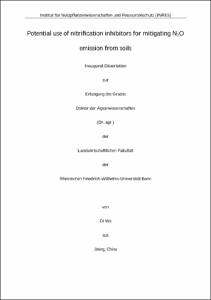Wu, Di: Potential use of nitrification inhibitors for mitigating N2O emission from soils. - Bonn, 2017. - Dissertation, Rheinische Friedrich-Wilhelms-Universität Bonn.
Online-Ausgabe in bonndoc: https://nbn-resolving.org/urn:nbn:de:hbz:5n-48611
Online-Ausgabe in bonndoc: https://nbn-resolving.org/urn:nbn:de:hbz:5n-48611
@phdthesis{handle:20.500.11811/7038,
urn: https://nbn-resolving.org/urn:nbn:de:hbz:5n-48611,
author = {{Di Wu}},
title = {Potential use of nitrification inhibitors for mitigating N2O emission from soils},
school = {Rheinische Friedrich-Wilhelms-Universität Bonn},
year = 2017,
month = dec,
volume = 390,
note = {The use of nitrification inhibitors (NI) to reduce nitrous oxide (N2O) emissions is a promising strategy to improve N fertilizer use efficiency and to help minimize emissions of the climate-relevant gas N2O in agricultural systems. Better understanding of factors and drivers controlling the N2O mitigation effectiveness is crucial for implementing optimal NI application strategies. However, the understanding of the underlying pathways involved in N2O production and consumption in soils is still fragmentary, which hampers real insight into the N2O mitigation mechanisms using NIs as well as NI mitigation effectiveness under various soil conditions. It has been generally assumed that nitrification inhibitors have no direct effect on denitrification and therefore should have no mitigation effect on N2O emissions derived from denitrification. However, the indirect impact of NIs, due to the reduced substrate (NO3-) delivery to those microsites where denitrification occurs, may have significant effects on denitrification product stoichiometry that may significantly lower soil-borne N2O emissions. Moreover, the inhibition effects of NIs on N2O produced via the nitrifier denitrification pathway could also play an important role, which has generally been neglected. These facts suggest that NI might be used for mitigating N2O emissions even under conditions of higher soil moisture.
The aim of this study was to in depth explore the driving factors and detailed mechanisms that determine the effect of NIs on N2O emissions in agricultural soils. Stable isotope and N2O isotopomer techniques were applied to trace N2O emissions sources. The obtained results in both field and laboratory studies did indicate that that NIs can be used as an effective management option to mitigate N2O emissions, not only under soil conditions favouring nitrification, but also in situations when soil denitrification/nitrifier denitrification potential is high, e.g., in N-fertilized and straw-amended moist soils. Significant evidence was found in this thesis for both German and Chinese soils that the high NI mitigation effectiveness in moist soil conditions is most likely due to the inhibition effects of NIs on N2O produced by denitrification and nitrifier denitrification. Thus, this study is a step forward in understanding the detailed mechanisms of the N2O-mitigating effect of NIs in soils. Compared with several alternative strategies such as application of urease inhibitor and hippuric acid, NI addition was found to be more reliable and efficient for reducing soil-emitted N2O in both field and laboratory studies and thus could be applied as an promising strategy in agricultural systems.},
url = {https://hdl.handle.net/20.500.11811/7038}
}
urn: https://nbn-resolving.org/urn:nbn:de:hbz:5n-48611,
author = {{Di Wu}},
title = {Potential use of nitrification inhibitors for mitigating N2O emission from soils},
school = {Rheinische Friedrich-Wilhelms-Universität Bonn},
year = 2017,
month = dec,
volume = 390,
note = {The use of nitrification inhibitors (NI) to reduce nitrous oxide (N2O) emissions is a promising strategy to improve N fertilizer use efficiency and to help minimize emissions of the climate-relevant gas N2O in agricultural systems. Better understanding of factors and drivers controlling the N2O mitigation effectiveness is crucial for implementing optimal NI application strategies. However, the understanding of the underlying pathways involved in N2O production and consumption in soils is still fragmentary, which hampers real insight into the N2O mitigation mechanisms using NIs as well as NI mitigation effectiveness under various soil conditions. It has been generally assumed that nitrification inhibitors have no direct effect on denitrification and therefore should have no mitigation effect on N2O emissions derived from denitrification. However, the indirect impact of NIs, due to the reduced substrate (NO3-) delivery to those microsites where denitrification occurs, may have significant effects on denitrification product stoichiometry that may significantly lower soil-borne N2O emissions. Moreover, the inhibition effects of NIs on N2O produced via the nitrifier denitrification pathway could also play an important role, which has generally been neglected. These facts suggest that NI might be used for mitigating N2O emissions even under conditions of higher soil moisture.
The aim of this study was to in depth explore the driving factors and detailed mechanisms that determine the effect of NIs on N2O emissions in agricultural soils. Stable isotope and N2O isotopomer techniques were applied to trace N2O emissions sources. The obtained results in both field and laboratory studies did indicate that that NIs can be used as an effective management option to mitigate N2O emissions, not only under soil conditions favouring nitrification, but also in situations when soil denitrification/nitrifier denitrification potential is high, e.g., in N-fertilized and straw-amended moist soils. Significant evidence was found in this thesis for both German and Chinese soils that the high NI mitigation effectiveness in moist soil conditions is most likely due to the inhibition effects of NIs on N2O produced by denitrification and nitrifier denitrification. Thus, this study is a step forward in understanding the detailed mechanisms of the N2O-mitigating effect of NIs in soils. Compared with several alternative strategies such as application of urease inhibitor and hippuric acid, NI addition was found to be more reliable and efficient for reducing soil-emitted N2O in both field and laboratory studies and thus could be applied as an promising strategy in agricultural systems.},
url = {https://hdl.handle.net/20.500.11811/7038}
}






